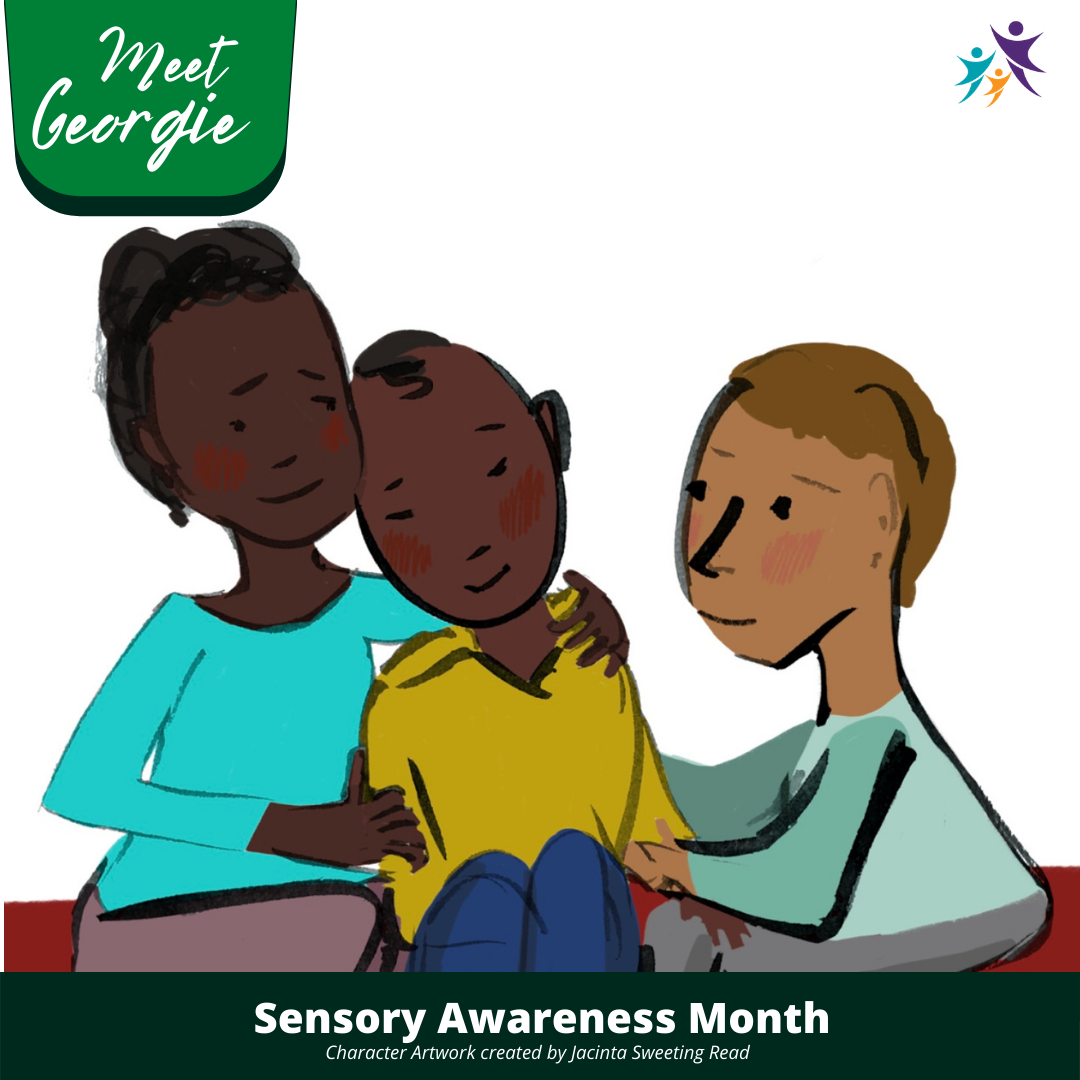

Downloadable Resource
You can download Georgie's story here:
Georgie English | Georgie German/Deutsch | Georgie Italian/Lingua Italiana | Georgie Spanish/Lengua Española | Georgie Chinese | Georgie Arabic
If you print with the "short binding" setting these read much like a children's book.
 Meet Georgie. Georgie is 18 years old. They like hanging out with friends, playing Animal Crossing, and enjoying a good burger.
Meet Georgie. Georgie is 18 years old. They like hanging out with friends, playing Animal Crossing, and enjoying a good burger.
Their home life has always been chaotic and no one really understands why. Georgie loves their parents who are warm, open, and caring. However, Georgie’s parents have found parenting hard, describing Georgie as explosive, obstructive, oppositional, and always on a hair trigger.
Georgie has been asked to do the washing up after dinner. They want to try, they want to be part of the family team. But dinner has already pushed George to a pretty high state of stress. This always happens when activities involve a lot of noise, smell, taste, and touch. Georgie prefers predictable foods (like burgers) and mealtimes with very little conversation. Being asked to do the washing up is hard for Georgie, because the sounds, smells, and gross feelings are all really stressful.
When Georgie’s little sister starts playing the drums in the background, it is just too much. Georgie explodes, “I can’t take this anymore,” and storms upstairs. Georgie’s parents are dismayed that this has happened again, their youngest is now upset, the dishes aren’t finished, and once again Georgie’s temper has ruined a family meal. Georgie’s parents are truly fed up.
Georgie is alone in their bedroom again. They know it doesn’t have to be like this, that their parents are nice people, but it’s so confusing. Why is everything so hard? Why is there always a fight? Georgie is desperate not to be seen as a bad kid anymore, and they long for connection with their family.
When your nervous system interprets everyday sensory data as intense, disgusting, too-much, overwhelming or even dangerous, your brain and body tend to live in a constant state of fight-or-flight readiness. Multiple studies have shown us over the last twenty years that a state of constant sensory-over-responsivity can have lasting negative impacts on well-being, sense of self and relationships. Two 2004 studies showed that sensory anxiety relates to relational anxiety and depression, and a 2020 study showed that sensory sensitivity is associated with anxiety disorder diagnoses and difficulties with emotion regulation. Your sensory health, including the way you build your lifestyle around your sensory profile, matters. If sensory integration and processing are so pivotal for psychological and relational well-being, why don’t more people talk about it? Why does it take some people until adulthood to hear about this important area of human development?

Sensory Health Supports Self Regulation
 Georgie sits down and does some research. They come across a checklist for differences in sensory processing and check 80% of the statements. Georgie is able to share this with their parents, and they all agree to approach the local adolescent occupational therapist who specializes in sensory integration and processing.
Georgie sits down and does some research. They come across a checklist for differences in sensory processing and check 80% of the statements. Georgie is able to share this with their parents, and they all agree to approach the local adolescent occupational therapist who specializes in sensory integration and processing.
Georgie’s occupational therapy evaluation demonstrates significant sensitivities to touch, sound, taste, smell, and movement in the field of vision. All of these sensations push Georgie into a heightened state of vigilance, causing their nervous system to go into high alert. Any other stressors then quickly push Georgie into a state of fight or flight. This has never been something Georgie can control with mind-over-matter. Georgie starts seeing a mental health provider and an occupational therapist who works with the whole family to start building a nourishing sensory lifestyle that will enable Georgie not just merely to survive, but also to thrive.
Does Georgie’s story sound familiar to you? For support with sensory over-responsivity, sensory anxiety, and/or a sensory integration and processing assessment, reach out to your school, local sensory-focused occupational therapy practice, or contact us at STAR Institute and we'd be happy to guide you.
Sensory Health Transforms Lives
Unidentified differences in sensory processing can undermine health and well-being at any age and in any context. If you are over-responsive to the sensory data from the world around you and from your own body, everyday life can feel like a battleground. Simple sounds, smells and touch sensations put your nervous system into a state of defensiveness and hyper-vigilance. The extra effort it takes to operate in a world that is not designed to support your sensory systems can lead to chronic dysregulation, anxiety/depression, and problems forming relationships.
STAR Resources
For more information on sensory over-responsivity: Subtypes of SPD - Over-Responsive | "Sensory Solutions - Sensory Over-Responsivity" | A Sensible Approach to Sensory Processing Disorder: Sensory Over-Responsivity
Adolescents experiencing sensory processing challenges can find support with STAR Institute's Teen Groups.

